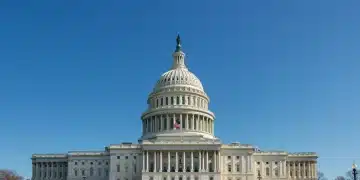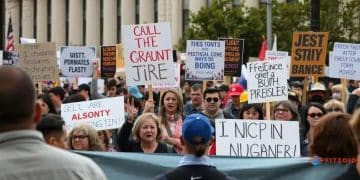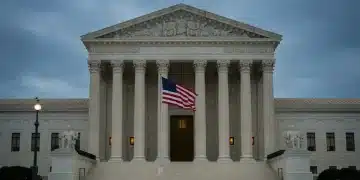Trump administration legal challenges and their implications
Anúncios
The Trump administration faced numerous legal challenges that reshaped public opinion, influenced governance, and raised questions about authority, accountability, and the political landscape in the United States.
Trump administration legal challenges have made headlines and sparked debate since day one. You might wonder how these trials have influenced politics and public perception. Let’s dive into this complex situation.
Anúncios
Overview of Trump administration legal challenges
The Trump administration legal challenges present a complex landscape of issues that have shaped recent political discourse. From the start, these challenges have raised questions about governance and legality. Understanding these cases helps to grasp their potential impacts.
Legal Landscape Overview
Anúncios
The legal battles faced during the Trump administration span various matters, from immigration policies to financial investigations. Each case not only influences the administration but also affects public trust in governance.
Key Legal Issues Faced
Several significant legal challenges dominated the news. They include:
- Impeachment proceedings and their implications
- Investigations into campaign finance violations
- Controversies surrounding immigration executive orders
Each of these cases reveals much about the political climate. For example, the impeachment proceedings highlighted deep divisions in Congress, while the consistently challenged immigration policies showed the complexities of balancing national security with human rights.
The fallout from these legal challenges goes beyond the courtroom. The public’s perception of the Trump administration has been influenced by media coverage and judicial outcomes. It raises questions about accountability and transparency in political affairs.
| Issue | Description | Impact |
|---|---|---|
| Impeachment Proceedings | Allegations of abuse of power and obstruction of Congress led to two impeachment trials. | Highlighted deep political divisions and tested constitutional processes. |
| Financial Investigations | Probes into campaign finance violations and alleged foreign business ties. | Raised concerns about ethics and transparency in leadership. |
| Immigration Executive Orders | Controversial policies like travel bans and family separations faced legal challenges. | Sparked nationwide protests and court rulings limiting executive power. |
| Public Perception | Legal battles influenced how citizens viewed the administration’s actions. | Increased polarization and debates over rule of law and accountability. |
| Legislative Impact | Ongoing legal issues affected the passage and focus of legislation. | Delayed policy initiatives and intensified partisan conflicts in Congress. |
| Electoral Influence | Legal controversies became central themes in election campaigns. | Shaped voter opinions and turnout, impacting election outcomes. |
| Future Governance | Legal challenges prompted discussions on executive authority limits. | May lead to reforms enhancing checks and balances in government. |
Public Response and Reactions
The response from the public and political figures has been varied, often polarized. On one side, supporters argue that these challenges are politically motivated. On the other, critics emphasize the importance of rule of law and the need for accountability.
These reactions can be summarized as follows:
- Supporters claim bias against the administration.
- Critics highlight the importance of upholding democratic principles.
- Both sides believe strongly in their viewpoints.
As these issues progress through litigation and public debate, their consequences will undoubtedly impact the political landscape. Citizens are increasingly aware of how legal challenges play into larger themes of governance and democracy. Such awareness is crucial for maintaining an informed electorate.
Key cases affecting Trump’s presidency

Throughout the Trump administration, several key cases have played a crucial role in shaping its presidency. These cases highlight the legal challenges and controversies that often surfaced in the political arena.
One of the most prominent legal battles was the impeachment process, centered on allegations of abuse of power and obstruction of Congress. This case stirred intense debates across the nation and tested the limits of presidential authority.
The Impeachment Trial
During the impeachment trial, many people closely followed the proceedings. It was a historic moment for American politics, as it was only the third time a president faced impeachment. Understanding this event involves considering:
- The charges brought against the president
- The outcomes of the Senate trial
- The reactions from both political parties
The trial showed the deep divisions in Congress and how partisan politics could overshadow legal proceedings. The public was divided, with many viewing the impeachment as necessary, while others labeled it a political maneuver.
Financial Investigations
Another significant area of scrutiny involved investigations into the president’s financial dealings. Reports suggested potential connections between the Trump organization and foreign entities. Such inquiries raised questions about conflict of interest and transparency.
Key points of these financial investigations include:
- Allegations of money laundering
- Tax evasion claims
- Scrutiny over business dealings with foreign governments
These cases prompted discussions about ethics and accountability in leadership. As investigations unfolded, they impacted the public’s trust in the administration.
Legal challenges during the administration didn’t stop here. Issues like immigration policies also faced legal interventions, leading to court rulings that challenged executive actions. This complex interplay of legal battles reveals the intricacies involved in governing a nation.
Political ramifications of the legal issues
The legal issues surrounding the Trump administration have profound political ramifications. These cases have not only influenced the administration’s policies but have also altered how the public perceives political leadership. Understanding these ramifications is crucial for grasping the current political landscape.
One significant impact is the deepening polarization among American voters. As legal challenges arose, they often became rallying points for different political factions. Many supporters of the former president saw these challenges as attacks against him, while detractors viewed them as necessary steps toward accountability.
Impact on Legislative Actions
Legal troubles also affected legislative processes. Lawmakers had to navigate a complex environment marked by scandals and trials. This environment influenced both bipartisan cooperation and partisan tensions. For instance:
- Negotiations on critical policies faced delays due to ongoing legal battles.
- Some lawmakers actively used legal challenges to bolster their political platforms.
- Others sought to distance themselves from the administration’s controversies.
These dynamics have made it challenging for Congress to address pressing issues effectively. As a result, many significant legislative actions were stalled, reflecting how legal matters can complicate governance.
Influence on Elections
The ramifications extend to electoral politics as well. The legal issues faced by the administration became central themes during elections. Candidates used these cases to frame narratives that resonated with voters. The discussions surrounding:
- The impeachment proceedings
- Investigations into election integrity
- Campaign financing violations
These topics dominated debates, shaping voter turnout and preferences. The legal challenges forced candidates to take stances, often cementing their support among their bases while alienating moderates.
Lastly, the Trump administration’s legal issues have sparked conversations about the rule of law and accountability in politics. Many citizens are now more aware of the mechanisms that hold leaders accountable, which could lead to increased civic engagement in the long run.
How the challenges shaped public opinion

The legal challenges faced by the Trump administration have significantly shaped public opinion in various ways. These issues have not only dominated headlines but also influenced how citizens perceive the government and its leaders.
Public reactions to these legal battles often align with partisan lines. Many supporters view the challenges as politically motivated attacks against their leader, while opponents see them as evidence of wrongdoing. This division has intensified, highlighting the existing rifts in American society.
Media Influence
The role of media is crucial in shaping public opinion during these legal challenges. News coverage can amplify narratives and sway perceptions. For example:
- Continuous coverage of impeachment proceedings kept the issue in public discourse.
- Investigative reporting shed light on potential misconduct, prompting discussions.
- Social media allowed for rapid dissemination of opinions and analyses.
This media landscape affects how people understand the situation. The narratives created around legal challenges contribute to the public mood, either fueling outrage or fostering support.
Impact on Trust in Government
Another significant aspect is the impact on trust in government institutions. As legal challenges arose, many began questioning the integrity of leaders. A growing number of citizens expressed skepticism toward politicians and the legal systems designed to hold them accountable.
Some key impacts are:
- An increase in calls for transparency in government actions.
- Growing voter engagement among those concerned about accountability.
- Discussions about reforming the political and legal systems to restore faith.
Such effects indicate the challenges have fueled a desire for change. Citizens are becoming more engaged in political discourse, driven by a sense of urgency to address perceived injustices.
Overall, the Trump administration’s legal challenges have deeply influenced public opinion, triggering debate about ethics, governance, and the rule of law. As the landscape continues to evolve, the lasting effects of these challenges will likely remain significant in shaping future political discourse.
Future implications for governance and law
The legal challenges faced by the Trump administration carry significant future implications for governance and law in the United States. These issues have not only tested the limits of presidential power but have also sparked conversations about reforming political norms.
These challenges force us to consider the future of executive power. The administration’s legal troubles have brought attention to the balance between authority and accountability. As a result, future leaders may have to navigate more scrutiny and demands for transparency.
Reevaluating Executive Power
One major implication is the potential reevaluation of executive power. With the controversies surrounding presidential actions, lawmakers may seek to establish clearer boundaries. This reevaluation could include:
- Reforming the impeachment process to make it more straightforward.
- Implementing stronger checks on executive orders.
- Increasing oversight of presidential actions.
Such changes may be necessary to restore public trust and ensure fair governance. By creating more robust legal frameworks, future administrations may operate under closer supervision.
Influence on Legislative Practices
Another important consequence is the influence on legislative practices. As legal battles strain the relationship between Congress and the presidency, we might see new legislative tools emerge. For example:
- Programs aimed at enhancing bipartisan cooperation may gain traction.
- Lawmakers could push for laws that promote ethical conduct and accountability.
- Revisiting campaign finance laws may become a priority.
These shifts will force politicians to adapt to a new reality where cooperation and ethics are paramount. The structure of governance may evolve as representatives work to meet the demands of an engaged citizenry.
Ultimately, the legal challenges during the Trump administration may serve as a catalyst for a broader discussion about governance and laws. Changes embodied by these implications will likely impact how future leaders operate, promoting a government that is more responsive to the people.
In summary, the impact of legal challenges on governance
The legal challenges faced by the Trump administration have reshaped American politics and governance in significant ways. These issues have not only influenced public opinion but also raised important questions about the powers of the presidency.
As we look to the future, it’s clear that these challenges will lead to a reevaluation of executive power and inspire reforms aimed at increasing accountability in government. Lawmakers may need to work together to adapt to the changing political landscape, ensuring that ethical standards are upheld.
Ultimately, the ongoing discussions about governance and law will encourage more active civic engagement, as citizens seek to hold their leaders accountable. These developments are crucial for fostering a transparent and effective government that serves the needs of all Americans.
FAQ – Frequently Asked Questions about Trump Administration Legal Challenges
What were some key legal challenges faced by the Trump administration?
The Trump administration faced various legal challenges, including impeachment proceedings, investigations into financial dealings, and controversies surrounding immigration policies.
How did the legal challenges affect public opinion?
The legal challenges polarized public opinion, with many supporters viewing them as politically motivated attacks, while critics saw them as necessary for accountability.
What future implications do these challenges have for governance?
The challenges may lead to a reevaluation of executive power and inspire reforms aimed at increasing accountability and transparency in government.
How can citizens engage with the political process in light of these challenges?
Citizens can become more informed and active in the political process by participating in discussions, voting, and advocating for policies that promote accountability and ethics.





